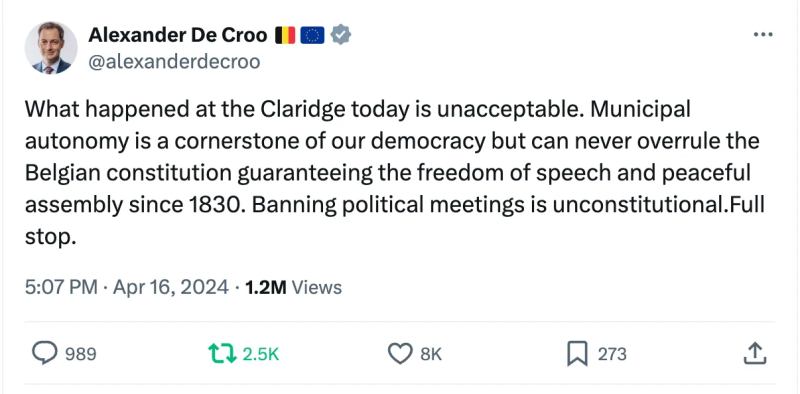
As Nigel Farage took to the stage on Tuesday in the Claridge in Brussels, a large contingent of police officers could be seen milling around the venue with an order to close the event, on the grounds that it was “creating a public disturbance.” Emir Kir, the mayor of Saint-Josse-ten-Noode, one of the nineteen municipalities of Brussels, had sent the police to shut down a National Conservatism conference, a gathering of conservative and right-wing intellectuals, politicians, and writers that included former British Home Secretary Suella Braverman, Brexit leader Nigel Farage, American conservative commentator Rod Dreher, and Hungary’s Prime Minister, Viktor Orbán, among others.
Remarkably, this was the third venue NatCon had attempted to secure in Brussels for their conference. The first venue, Concert Noble, had cancelled under pressure from the socialist mayor of Brussels, Philippe Close. The second venue, the Sofitel Brussels, had also caved to pressure, this time from the mayor of Etterbeek neighbourhood in Brussels, Vincent De Wolf.
The order to shut down the National Conservatism conference made reference to the “ethically conservative” vision of NatCon, its “Eurosceptic” attitude, and the fact that some of its speakers were “reputed to be traditionalists,” and argued that the conference must be banned “to avoid foreseeable attacks on public order and peace” (more details can be found on the website of the Alliance for the Defence of Freedom).
While mayors have the right to shut down events that represent a genuine threat to public order, this was a perfectly peaceful gathering, and no substantive evidence was presented to suggest that the organisers were “disturbing the peace.” The organisers appealed the order issued by mayor of Saint-Josse-ten-Noode to terminate the event, and remarkably, managed to secure a midnight emergency hearing in Belgium’s highest court, the Conseil d’Etat.
In the dark hours of the night, the court handed down a decisive victory for free speech, rejecting the mayor’s bizarre argument that the possibility of a leftist counter-protest converted the conservative event into a threat to public order. As reported by ADF International, who provided legal support to NatCon,
In the decision, considered a victory for free speech, the court decided that “Article 26 of the Constitution [of Belgium] grants everyone the right to assemble peacefully,” and although the mayor has the authority to make police ordinances in case of “serious disturbance of the public peace or other unforeseen events,” in this case there was no sufficient threat of violence to justify this. The Court reasoned that “it does not seem possible to infer from the contested decision that a peace-disrupting effect is attributed to the congress itself.” Rather, as the decision notes, “the threat to public order seems to be derived purely from the reactions that its organization might provoke among opponents.”
Shortly before the court’s decision was announced, the Belgian Prime Minister had already weighed in in defence of the conference participants’ right to speak and assemble freely.

It is truly lamentable that a mayor of the administrative capital of Europe was prepared to send in police to forcefully shut down a peaceful event, largely because it was on the “wrong” side of the political spectrum. Nevertheless, we should take a deep sigh of relief that Belgium’s political and legal system did in fact come to the defence of NatCon’s right to freedom of speech and assembly, with a robust and swift judicial intervention and a strong defence of free speech by the Prime Minister of Belgium.
This bizarre saga leaves one wondering: where is the looming threat of authoritarianism in Europe – in right-wing conservatives who gather in hotels to talk about the future of Europe, or in leftist activists and mayors who want their political adversaries silenced and “cancelled” before they even open their mouth?
Republished from the author’s Substack
Disclaimer
Some of the posts we share are controversial and we do not necessarily agree with them in the whole extend. Sometimes we agree with the content or part of it but we do not agree with the narration or language. Nevertheless we find them somehow interesting, valuable and/or informative or we share them, because we strongly believe in freedom of speech, free press and journalism. We strongly encourage you to have a critical approach to all the content, do your own research and analysis to build your own opinion.
We would be glad to have your feedback.
Source: Brownstone Institute Read the original article here: https://brownstone.org/

